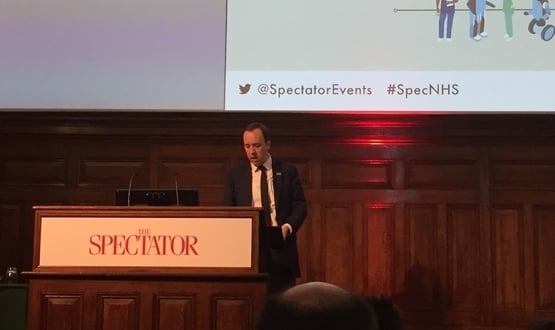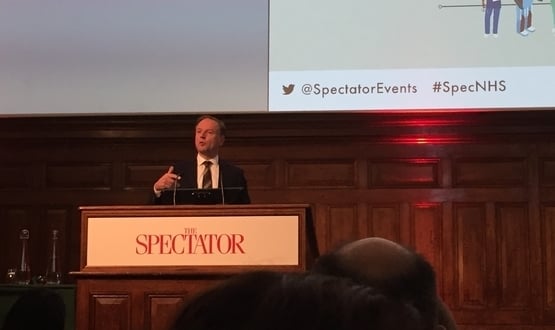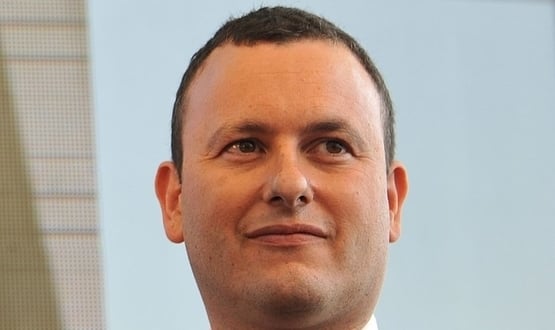Hancock says the ‘tide of technology should be embraced’
- 19 March 2019

Health secretary Matt Hancock has said the “tide” of technology in the NHS should not be held back but embraced.
In a speech at the Spectator Health Summit event in London on 18 March, Hancock stated he firmly believed in the future robotics, personalised medicines, artificial intelligence and genomic sequencing will become a “routine, everyday part of healthcare”.
But rather than shying away from this, Hancock added that he wants to embrace it saying that some would argue the technology tide needs to be held back.
He said: “Yet, history has shown us time and again, it’s better to shape change than to fight it.
“It’s better to be in favour of the future than live in fear of it.
“And when I am out in hospitals and talking to NHS teams across the country, I also know that people – patients and staff – are enthusiastic to embrace technology.
“They increasingly expect it to be there. Technology is across all other parts of their lives.”
Hancock also addressed concerns surrounding a diminishing workforce and imperfect technology.
He said: “We do need more doctors, and the technology isn’t perfect.
“But the response, to both of these challenges, is to make the technology better, not to reject it altogether, in a spirit of rational enquiry and scientific progress.”
Hancock also provided another small glimpse in what lies in store for the new NHSX unit saying it will be “a brand new, specialist bridge between the worlds of healthcare and technology”.
He said: “It’s going to work with industry and in-house teams to create a culture of innovation and experimentation within the NHS so proven, safe, tested existing technology spreads faster across the system – and we break up some of the silos that slow down progress.
“We’ll ensure we keep our first-ranked place at the forefront of the global debate around genomics so we can create an ethical framework to ensure this exciting new tech is developed responsibly.”

Other speakers at the event included NHS England chief executive, Simon Stevens, who said the health service needs to be “permeable to innovation”.
However when asked about the potential that technology could alienate some areas of society, Stevens said they should be “additional options” rather than substituting face to face options.
Stevens also emphasised that technology should assist clinicians rather than adding more tasks needed to be done during their day, referencing the recent Topol Review which argued technology can help free up doctor’s time.





4 Comments
Talking of tides, does Matt think he is King Canute? Tides can be very useful when you have a process to harness their power.
When I read articles like this I get very concerned that technology is seen as a solution on its own and not – what it is – just as an enabler to improve the delivery of health and care. On page 67 of the Topol Review there is this very important paragraph:
“Introducing new technologies to support patient care and the workforce needs to be seen as change management, with the technology itself simply the tool to enable change. Most patient care pathways are multifaceted, involving staff with deeply held personal, social and institutional beliefs and practices. To be successful, technology-based change policies need to acknowledge and seek to understand these beliefs and practices. This requires organisations to focus on the following enabling factors: a culture of innovation; prioritising people; an agile and empowered workforce; leadership; effective governance; and investment.”
If we forget this and just expect new resources to spout out of the ground when technology is installed, we will create a whole generation of technophobic clinicians and set back the advancement of medicine in the UK by many years.
There is a clear tension in what has been outlined here
– a culture of innovation and experimentation within the NHS so proven, safe, tested existing technology spreads faster across the system – and we break up some of the silos that slow down progress.
Most of the technology that has shaped how service is delivered and has changed our lives over the last few year has been created by innovation and experimentation that is “good enough”. It has been for the most part “proven, safe, tested ” as doing this (especially to a clinically acceptable standard) takes many years.
If we are truly going to shape the future we have to work out how to create change that will have risk of failure and well patient harm.
The very simply Speed vs Quality vs cost is alive. The Quality component has been the one that has been negated over the last 10 years for increased Speed and reduced cost of change.
Are we really ready to do that in our clinical world…
The Victorians took the view that children should be “seen and not heard”. Mr Hancock takes the view that patients should be neither seen nor heard. He is making excellent progress with that.
Comments are closed.